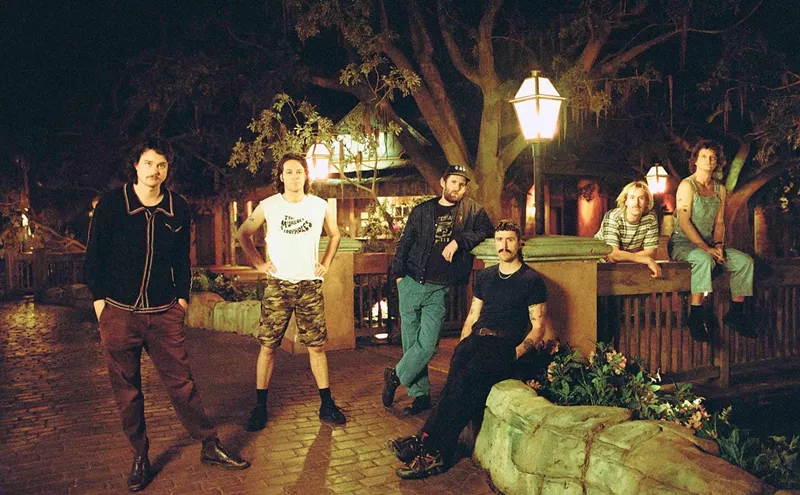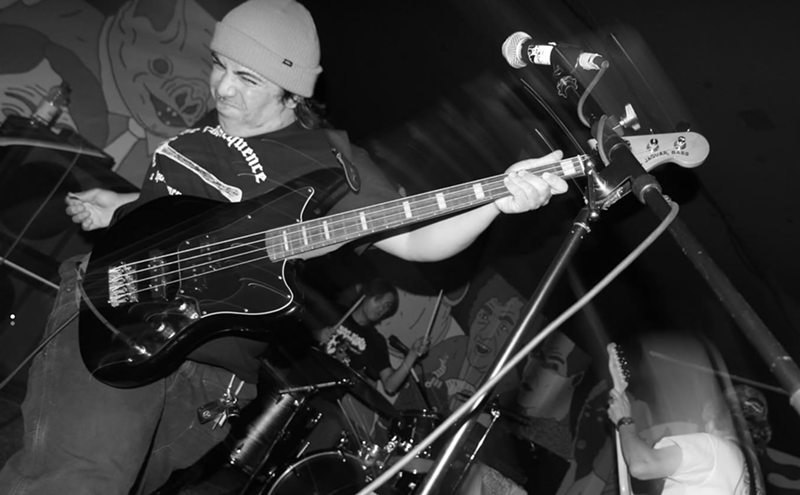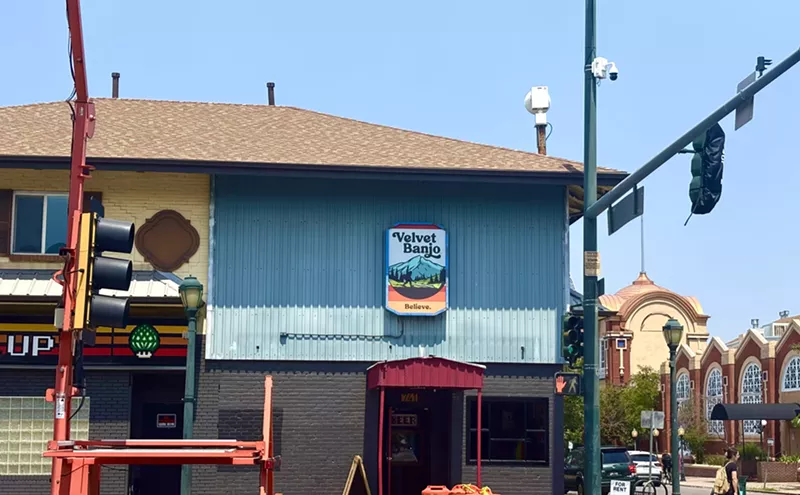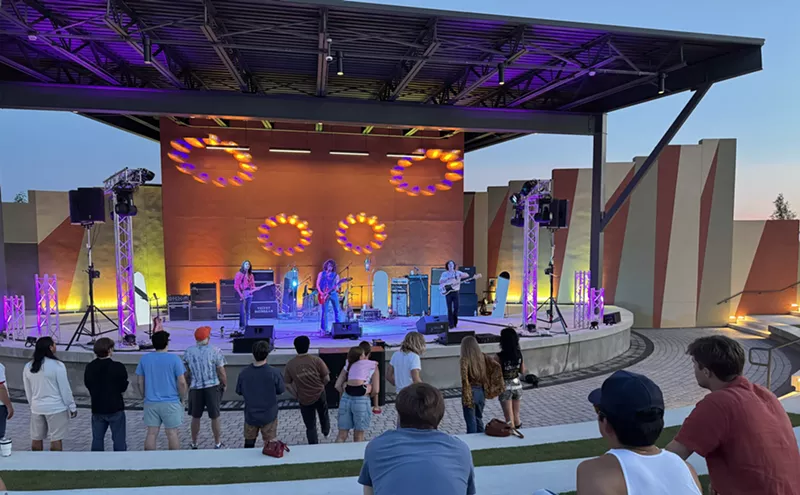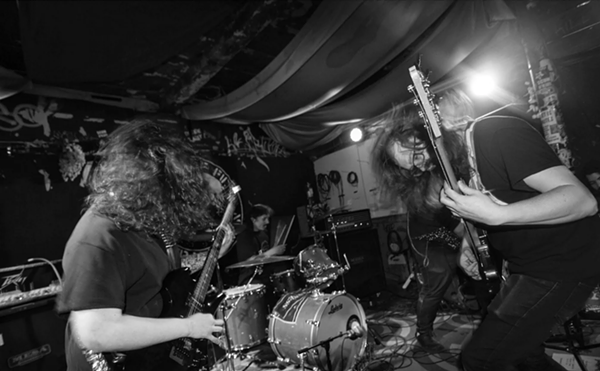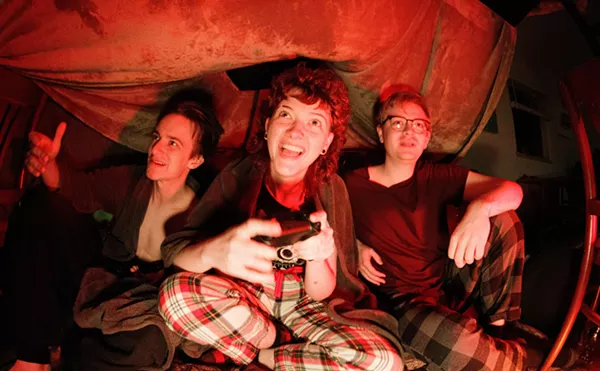"To go back on stage and really perform, like we're doing right at the moment, is a real joy," says Fletcher, who functions as the group's most enthusiastic cheerleader. "I was watching during our show in Berlin, and Dave was singing fantastically, the audience was going crazy, and I was just staring at it all--and I ended up forgetting what I was playing. It was spectacular, and the crowd response was unreal. It's just been great fun."
The previous four years weren't nearly as enjoyable for the bandmates: During this period, Gahan attempted suicide and Fletcher suffered a nervous breakdown. But Depeche Mode's singular amalgamation of electro-production and composition-based pop craft never went out of vogue thanks largely to the untidy obsessions of diehard admirers, Eighties-era fanatics and hipsters who see the group as a precursor to the exploding electronic-music scene. Not that the players can be accused of trying to capitalize on their role as pioneers. "We're really into a slow groove these days," Fletcher admits. "Faster rhythms aren't particularly appealing right now, and we've never really been into techno. It's very hard to write classic songs with that type of music."
Tunes form the backbone of the outfit's legacy: "Just Can't Get Enough," a 1981 cut issued as its third single, began an unbroken chain of chart-climbers that have thrilled fans every bit as much as they've bored or bothered naysayers. The liner notes to Catching Up With Depeche Mode: The Singles, 1981-1985, a mid-Eighties collection that's just been expanded to include several additional tracks, spotlights some typical gibes: Future Pet Shop Boy Neil Tennant, then the editor of Smash Hits magazine, refers to "Blasphemous Rumours" as a "routine slab of gloom," while Gang of Four's John Gill says, "I have often wondered why God bothered with Depeche Mode." Now, however, the worm has turned. "We've been getting fantastic reviews," Fletcher notes. "In our career now, we can't seem to do much wrong. It's quite nice for a change, I suppose."
The band sprang to life in 1980 in the small manufacturing burg of Basildon, UK, and while Fletcher, Gahan and Gore were part of its original lineup, keyboardist Vince Clarke was the act's mastermind: He wrote Depeche Mode's earliest material and insisted upon a pure electronic approach that ignored traditional rock accoutrements such as guitars. The combination of these elements with Kraftwerkian factory beats and a leather-and-eyeliner look cribbed from David Bowie soon caught the attention of Daniel Miller, a producer and founder of Mute Records. He subsequently signed the aspiring celebrities to a deal and issued Speak and Spell, a 1981 platter filled with somewhat dour but incredibly catchy music written entirely by Clarke. In short order, Depeche Mode was famous.
Success couldn't keep the group together, however: At the end of 1981, Clarke split, citing the band's hectic touring schedule as the primary motivation for his departure. An immensely skilled knobs-and-buttons man, the studio-fixated Clarke went on to form three more seminal electro-bands: Yazoo (aka Yaz), co-starring Alison Moyet; the Assembly, featuring Feargal Sharkey; and Erasure, a partnership with Andrew Bell previously profiled in these pages ("Erasing the Past," June 5, 1997). But strangely enough, his defection had only a minimal impact on Depeche Mode's progression. "We were so young in those days that we didn't even think about it twice," Fletcher says. "We just carried on."
Drummer Alan Wilder, who joined Depeche Mode in 1983, helped fill part of the gap left by Clarke; according to Fletcher, "Alan's impact on the group was more significant than Vince's in the end." But Gore was primarily responsible for making the transition a smooth one. He took over as the band's chief songwriter and philosophical scratching post, and although "See You," "The Meaning of Love" and "Leave in Silence," the first three singles he penned, were technically scrawny numbers that lacked the creative spark of Clarke's compositions, "Everything Counts," issued in 1983, was a genuine breakthrough. Its popularity paved the way for "People Are People," an effort that landed the outfit on the airwaves of America--and Depeche Mode stayed there thanks to Gore, whose knack for radio-friendliness helped the outfit avoid the fate that befell one-shots like A Flock of Seagulls and Modern English. "We're very lucky that Martin writes consistently good songs," Fletcher says. "It obviously doesn't matter what type of music you play, whether it's rock or jazz or whatever. Because if you write good songs, you're in with a shout, now, aren't you?"
But Depeche Mode proved to be more than a singles band. On albums such as 1982's A Broken Frame, 1983's Construction Time Again, 1984's Some Great Reward and the murky 1986 masterpiece Black Celebration, highlighted by the gothic keyboard fantasia "A Question of Lust," Gore took the group into uncharted territories via computer programming, aural manipulation and machine-age malaise inspired by the influential German collective EinstYrzende Neubauten. Even better was 1987's Music for the Masses, an appropriately titled epic loaded with dirty, hook-ridden tracks such as "Strangelove, "Never Let Me Down Again" and "Behind the Wheel." The album, which sounded like David Lynch at the discotheque, provided cynical teens everywhere with a tantalizing taste of the future.
Violator, from 1990, was another blockbuster, and arguably Depeche Mode's finest offering. Gore broke Clarke's electronic-only law by adding guitars, his instrument of choice, to the band's mix, thereby giving "Personal Jesus," "Policy of Truth" and others an industrial edge that testosterone junkie Trent Reznor would later emulate. But 1993's Songs of Faith & Devotion was a step backward--a terrible hodgepodge of arena rock and disco built upon the awful, half-baked ditties "I Feel You" and "Condemnation." The quartet seemed confused about its direction, and a notoriously debauched series of dates in support of Devotion hardly clarified the situation; insecurity spurred by the rise of grunge led to an orgy of drugs, alcohol and sex that left the music, and the musicians, seeming emptier than ever. "There was a time--that dark period--during the tour where I really didn't think we'd get back on stage again, then or in the future," Fletcher says.
The situation didn't improve after Depeche Mode returned from the road. Wilder left the group to focus on Recoil, a cutting-edge project that's allowed him to collaborate with Diamanda Galas, among others. As for Gahan, who'd begun to take his reputation as a rock icon a bit too seriously, he tried to kill himself in 1995 while living in Los Angeles, and an overdose the following year at West Hollywood's Sunset Marquis Hotel nearly claimed his life as well. Fletcher, who steers away from discussing Gahan's plight, was also losing his grip. "At the time, I didn't know why it happened," he says. "But we'd been in the studio and then straight on tour for fourteen months, and I think it was just too much. It was a heavy bingeing tour, and I just think everyone cracked. But we've come back. We've taken things very slowly, and it's worked well."
In 1997, the Mode men (including Gahan, who stabilized after serving a little jail time and completing drug rehabilitation) gathered to make a comeback album. The task was complicated by the absence of Wilder, Fletcher concedes. "We had to think how we would redo things after Alan left. But once we made that decision, it's operated in our favor. You say things work well in the end? Well, Alan leaving the band was very sad, but it also inspired us to go and use other musicians." With the assistance of Can drummer Jaki Leibzeit and Bomb the Bass programmer Tim Simenon, the group assembled Ultra, a chronicle of Depeche Mode's near demise. Fueled by the scratchy "Barrel of a Gun" and "It's No Good," a return to straightforward electro, the full-length sold more copies than any of the group's previous discs.
The Singles 86>98 includes "Only When I Lose Myself," a new trip-hop single produced by Simenon, as well as an avalanche of Depeche Mode favorites. The concerts inspired by the package take advantage of this catalogue while indulging in the band's trademark theatricality. "It's like Cabaret," Fletcher says. "The tour is all glitz, like a peep show. It's not so high-tech, and it relies on us performing very well on stage."
At present, no new recordings are on the drawing board. "We're generally taking it easy with our career at the moment," Fletcher says. "We're all about enjoying ourselves, not rushing to decisions. We want to get this tour out of the way first and then see how we feel." However, he adds, changes in logistics should facilitate recording: "Dave lives in New York now, which is easier than when he lived in L.A. I mean, you don't have to find an excuse for me and Martin to go on a trip to New York." Just as important, "we are getting on well at the moment. A more sober attitude does mean that you get on better."
If this state of affairs continues, there's no reason why Depeche Mode shouldn't keep frustrating non-believers--and thrilling the faithful--for a long time to come.
Depeche Mode, with Stabbing Westward. 7:30 p.m. Sunday, November 29, McNichols Arena, $22-$38.50, 303-830-8497.



